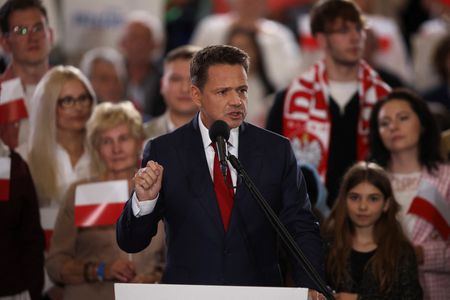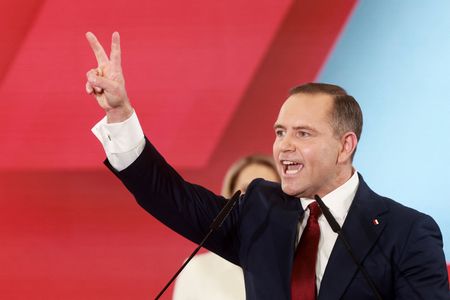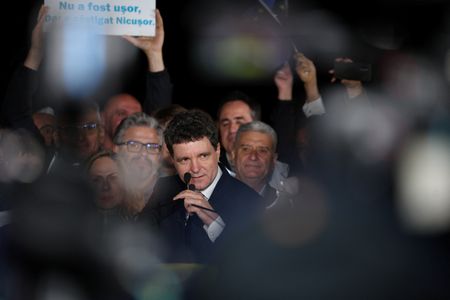By Anna Wlodarczak-Semczuk and Pawel Florkiewicz
WARSAW (Reuters) -The centrist and nationalist hopefuls contesting Poland’s presidential election runoff began trying to win over the supporters of eliminated candidates on Monday, in a major test of the coalition government’s pro-European policies.
A broad alliance led by Prime Minister Donald Tusk swept to power in 2023 promising to mend ties with the European Union and undo judicial reforms implemented by the previous Law and Justice (PiS) rulers, which the EU said undermined democracy.
However, Tusk’s agenda has been stymied by the veto powers of the outgoing president, PiS-ally Andrzej Duda.
Rafal Trzaskowski, from Tusk’s ruling Civic Coalition (KO), narrowly led Karol Nawrocki, the candidate backed by the conservative-nationalist PiS, on Sunday, by 31.4% to 29.5%, a much narrower gap than opinion polls had suggested.
But a surge in support for far-right and anti-establishment candidates left the runoff on a knife-edge.
An Opinia24 poll for private broadcaster TVN published after the first round gave Trzaskowski 46% in the runoff and Nawrocki 44%, with 10% undecided or refusing to say. The second round takes place on June 1.
“We have to talk to everyone, the most important thing is the arguments,” Trzaskowski, the mayor of Warsaw, told reporters. “I’m glad that many young people went to the polls, but it’s a great challenge to convince them to vote for me.”
Nawrocki said he would seek support from both left and right.
“My social agenda and the fact that I will be the guardian of the social achievements of the Law and Justice government and Solidarity (trade union) make it an offering for left-wing, socially sensitive circles too,” he said.
The far right achieved its best result ever. Slawomir Mentzen of the Confederation party and Grzegorz Braun, who in 2023 caused international outrage by using a fire extinguisher to put out Hanukkah candles in parliament, together scored over 21%.
Many young voters have expressed disillusionment with the dominant parties, KO and PiS, and Mentzen in particular enthused them with an economically liberal, eurosceptic and anti-immigrant programme that he says provides an alternative to both.
But Mentzen has criticised Nawrocki and analysts say it is by no means certain that all his supporters will back the PiS candidate.
Meanwhile two left-wing candidates together scored just over 9% on Sunday. But neither gave Trzaskowski an unequivocal endorsement.
Magdalena Biejat, whose party belongs to Tusk’s coalition, said Trzaskowski must show that he “treats left-wing voters seriously”.
(Reporting by Anna Wlodarczak-Semczuk and Pawel Florkiewicz, writing by Alan CharlishEditing by Lincoln Feast, David Goodman and Kevin Liffey)











